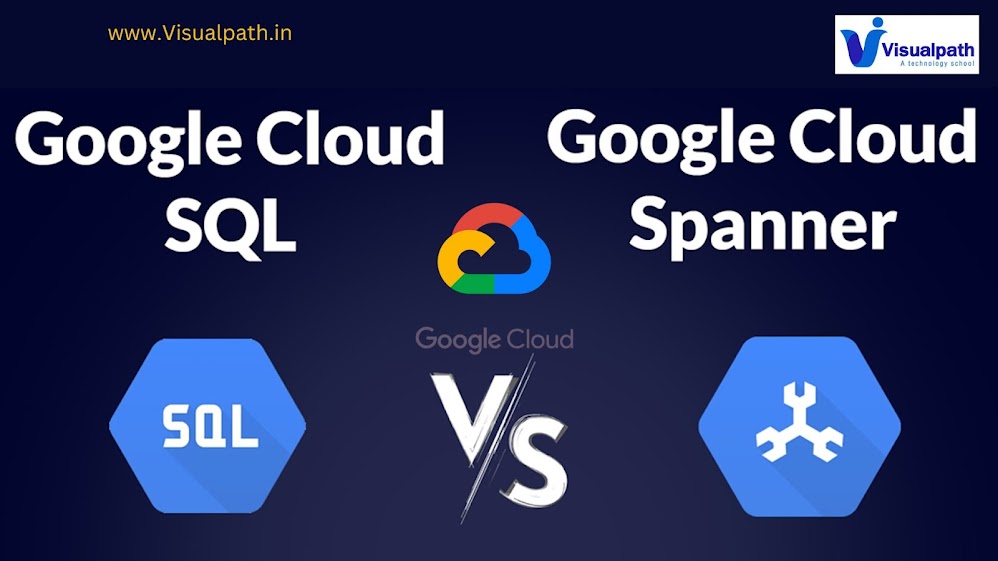- Get link
- X
- Other Apps
- Get link
- X
- Other Apps
The Main Differences Between Cloud SQL and Cloud Spanner?
Cloud SQL and Cloud Spanner are both managed database
services offered by Google Cloud Platform (GCP), but they have distinct differences in terms of
architecture, scalability, consistency, and use cases.
Here are the main differences between Cloud SQL and Cloud Spanner:
GCP Data Engineer Training in
Hyderabad
1. Database Type:
· Cloud SQL: Cloud
SQL is a fully managed relational database service that supports popular
database engines such as MySQL,
PostgreSQL, and SQL Server. It is suitable for traditional relational database
workloads.
· Cloud Spanner:
Cloud Spanner is a globally distributed, horizontally scalable, and strongly
consistent database service designed to handle large-scale, mission-critical
transactional workloads. It is a fully managed, relational database with
horizontal scalability and ACID transactions.
2. Scalability:
· Cloud SQL:
Cloud SQL scales vertically by increasing the compute and storage resources of
individual database instances. It is limited by the capacity of a single
instance and may not be suitable for highly scalable or distributed
applications.
· Cloud Spanner:
Cloud Spanner scales horizontally by distributing data across multiple nodes
and regions, allowing it to handle massive scale and high concurrency. It
automatically scales to accommodate increasing workloads without downtime or
manual intervention. - GCP Data Engineering
Training
3. Consistency Model:
· Cloud SQL: Cloud
SQL provides strong consistency within a single database instance but does not
offer globally consistent transactions across distributed instances.
· Cloud Spanner:
Cloud Spanner offers strong external consistency across globally distributed
data, ensuring that transactions are ACID-compliant
and consistently applied across all regions.
4. Global Distribution:
· Cloud SQL:
Cloud SQL instances are typically deployed in a single region or zone, although
replication can be configured for high availability within the same region.
· Cloud Spanner:
Cloud Spanner is designed for global distribution, with data automatically
replicated across multiple regions to provide high availability, fault
tolerance, and low-latency access for users worldwide. - Google Cloud Data
Engineer Training
5. Use Cases:
· Cloud SQL:
Cloud SQL is well-suited for traditional relational database workloads, such as
web applications, content management systems, and business-critical
applications that require a relational database model.
· Cloud Spanner:
Cloud Spanner is ideal for globally distributed, high-throughput, and
high-availability applications that require strong consistency, scalability,
and transactional integrity, such as financial services, e-commerce, gaming,
and IoT platforms.
In summary, while both Cloud
SQL and Cloud Spanner are managed database services provided by Google
Cloud Platform, they serve different use cases and have distinct
characteristics in terms of scalability, consistency, global distribution, and
database type. Organizations should choose the appropriate service based on
their specific requirements, workload characteristics, and performance
considerations. - Google Cloud Data Engineering
Course
Visualpath
is the Best Software Online Training Institute in Hyderabad. Avail complete GCP Data Engineering worldwide.
You will get the best course at an affordable cost.
Attend
Free Demo
Call on - +91-9989971070.
WhatsApp: https://www.whatsapp.com/catalog/919989971070
Visit
https://visualpath.in/gcp-data-engineering-online-traning.html
GCPDataEngineeringtraining
GCPDataEngineerTraininginHyderabad
GoogleCloudDataEngineeringCourse
GoogleCloudDataEngineerOnlineTraining
GoogleCloudDataEngineerTraining
GoogleDataEngineerOnlineTraining
- Get link
- X
- Other Apps

Comments
Post a Comment